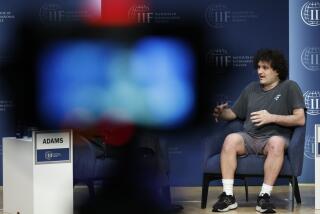Keating Predicts S&L; Bailout Will Cost $500 Billion : Thrifts: The Lincoln executive accused regulators of wrongfully confiscating his firm.
- Share via
WASHINGTON — Charles H. Keating Jr., owner of the scandal-plagued Lincoln Savings & Loan of Irvine, predicted Sunday that the federal bailout of the nation’s insolvent S&Ls; ultimately will cost more than $500 billion, not the $300 billion now generally accepted.
Keating also denied any wrongdoing in making $1.3 million in campaign contributions and other donations to Sen. Alan Cranston (D-Calif.) and four other U.S. senators who intervened with federal regulators on behalf of Lincoln, and he accused regulatory officials of “confiscating” his S&L.;
“The government is just plain wrong, and the accounting documents will prove it,” Keating said of the regulators’ charges. “It seems to me that something’s wrong with a government that takes away a profitable property,” he added.
Keating made his comments on the NBC television program, “Meet the Press.” He also blamed federal regulatory officials and members of Congress for not heeding his own warnings about the plight of the savings and loan industry.
“Had they listened to (Cranston and) the (four other) senators (who accepted campaign contributions from him) and had they listened to me, there wouldn’t be the mess today,” he asserted.
Besides Cranston, the senators under investigation include Democrats John Glenn of Ohio, Donald W. Riegle Jr. of Michigan and Dennis DeConcini of Arizona, and Republican John McCain of Arizona. The Senate Ethics Committee is probing possible influence peddling in the case.
Keating’s assessment that the S&L; rescue effort eventually could cost more than $500 billion included the depreciation of the real estate held by insolvent S&Ls;, which the regulators plan to sell to help finance the bailout.
The estimate of $300 billion widely used by most industry experts covers only the expected costs of dismantling the troubled S&Ls; and paying off depositors, whose savings were insured by the Federal Deposit Insurance Corp. The Treasury has estimated immediate costs at $157 billion.
An initial probe of Lincoln’s accounts has suggested that Lincoln, under Keating, entered into dozens of questionable business deals, from speculating in real estate to issuing junk bonds. There also are questions over how well Lincoln’s auditors did their jobs.
The regulators also have contended that executives of Phoenix-based American Continental, Lincoln’s former parent company, are draining it of cash by financing legal bills for Lincoln and Keating. And they have asked the courts to oust Keating as chairman of the larger firm.
The cost of bailing out Lincoln alone is expected to exceed $2 billion, making it the most expensive thrift rescue in history. The regulators seized Lincoln last April 14, the day after the Phoenix-based company, which Keating also owned, went bankrupt.
As he has during other appearances in recent weeks, Keating on Sunday dismissed the government’s allegations as “just not true,” contending that federal regulators, not he, were at fault.
He also said there was nothing wrong in his decision to transfer millions of dollars of Lincoln’s assets to investments in Europe and the Bahamas. He argued that “Lincoln was the forerunner of seeing this becoming more and more one economic world.”
In warning of the consequences of the government’s bailout effort, Keating predicted that the selloff of real estate assets owned by insolvent S&Ls; “simply won’t work” and would “wreck the markets throughout the country for years to come.”
More to Read
Inside the business of entertainment
The Wide Shot brings you news, analysis and insights on everything from streaming wars to production — and what it all means for the future.
You may occasionally receive promotional content from the Los Angeles Times.










